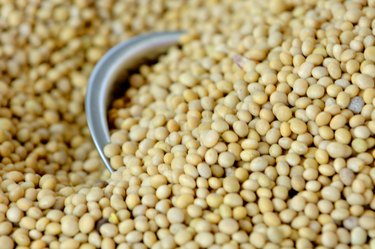
Beans and rice are staples across the world. Not only are legumes and grains affordable, accessible, comforting and delicious, they are also packed with nutrients and health benefits. In fact, you can lose weight eating beans and rice every day.
Due to their protein content and nutrient density, the USDA Dietary Guidelines recommends that Americans increase their consumption of beans and legumes. They are especially high in fiber and potassium, which are two nutrients that Americans often under-consume. Many vegans and vegetarians incorporate beans as a main protein source in their meatless diets. However, carnivores can enjoy these legumes, too. To avoid getting bored of one type of bean, here are a variety of beans to choose from: black, pinto, kidney, garbanzo, cannellini and more.
Video of the Day
Video of the Day
Black Beans Nutrition Facts
Out of the many varieties of beans, black beans are among the most common. They can be bought canned or dried. The cooking method and ingredients may alter the black beans' nutrition.
According to the USDA, 1 cup of boiled black beans contains:
- 227 calories
- 0.9 grams of fat
- 40.9 grams of carbohydrates
- 15 grams of fiber
- 15.2 grams of protein
- 29 percent daily value (DV) of magnesium
- 20 percent DV of iron
- 18 percent DV of zinc
- 13 percent DV of potassium
Black bean nutrition facts also indicate that they are low in saturated fat, sugar and sodium, while being free of cholesterol.
The fiber and potassium content in black beans are especially notable. Per the National Institutes of Health, Americans consistently consume less potassium than recommended, which is why potassium is considered a nutrient of public health concern. Black beans are one dietary source of potassium to help prevent or address potassium deficiency. Similarly, a January 2017 study published in the American Journal of Lifestyle Medicine found that Americans do not consume enough fiber. The dietary requirement for fiber is 25 grams per day for adult females and 38 grams for adult males, so 1 cup of black beans gets you 40-60 percent there.
Beans and Weight Loss
To lose weight eating beans and rice, you must implement a caloric deficit. This can be achieved through burning more calories than you consume, either through diet, exercise or a combination of both.
The advantage of a bean diet is that beans are low in fat yet high in protein, fiber and other nutrients. By adopting a bean diet, you can encourage healthy weight loss while still meeting your nutritional targets.
A May 2016 study published in the American Journal of Clinical Nutrition found that dietary pulse consumption can aid weight loss. Pulses are the edible non-oil seeds of legumes, such as beans, lentils, chickpeas, and dry peas. Researchers of this study looked at the effects of beans on body weight and body fat. The study concluded that consuming beans is an effective weight loss strategy even in diets that are not restricted in calories.
If you follow a low-calorie diet and worry about the 227 calories per 1 cup of black beans, you can split the serving throughout the day. Half a cup of beans with your lunch and dinner will keep you full and satisfied without going over on your calorie goal.
Eat More Beans
Consuming a predominantly bean diet has many benefits. Nutritionally, they are packed with macronutrients like protein and micronutrients like iron, potassium and magnesium. You can even lose weight eating beans and rice if weight loss is your goal.
To incorporate beans into your lifestyle, add them to soups, salads, stews and more. Beans are also perfect in chili recipes. Make sure you have beans in your kitchen at all times by stocking up on canned beans. Alternatively, you can buy dried beans and cook them yourself in large batches.
- USDA Dietary Guidelines: “A Closer Look at Current Intakes and Recommended Shifts”
- MyFoodData: “Nutrition Facts for Black Beans”
- National Institutes of Health: “Potassium”
- American Journal of Lifestyle Medicine: “Closing America’s Fiber Intake Gap”
- American Journal of Clinical Nutrition: “Effects of dietary pulse consumption on body weight: a systematic review and meta-analysis of randomized controlled trials”